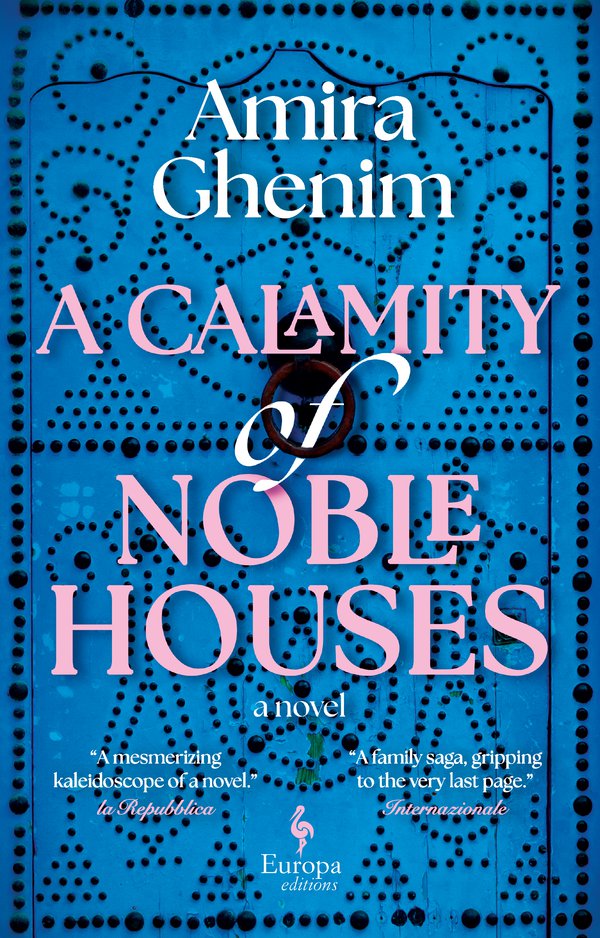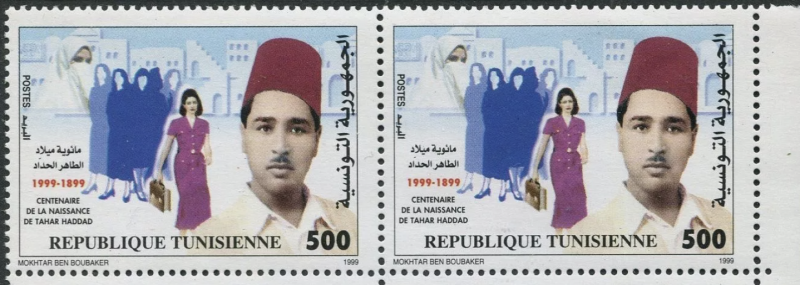“Family secrets, locked in their owners’ chests, forced into a dark corner and covered with a thousand veils. And why wouldn't they hide these shameful events that, if exposed to the curious public, would be a blot on their noble bloodline for generations to come?”
- “A Calamity of Noble Houses”
In her latest book, Amira Ghenim, an award-winning Tunisian author, fictionalizes Tahar Haddad’s life, a significant public figure in the fighting for women’s rights and liberties under French colonial rule, as a tribute to his social reforms in Tunisian society.
In A Calamity of Noble Houses, Zbaida Rassaa, wife of Mohsen Ennaifer, receives a secret letter from Haddad, her old lover. Mohsen’s parents accuse her of an affair with him and the scandal is then narrated by the two noble families who revisit the affair and its effect on the marriage. These narrations reveal old secrets and confessions about the night of the scandal and the couple's relationship after the incident, while shifting between different perspectives in storytelling.
Ghenim engages readers in layered narrations and perspectives which illustrate the grievances found within Tunisian society, including opinions about women and marriage, lived experiences, social norms, and societal expectations.
Ghenim’s characters and their internal monologues and external dilemmas shed a light on the stark contrast between modernity and tradition prevalent under colonial rule. Modernity, imposed by the French, created an everlasting conflict of held values and perceived identities, represented by each family in Ghenim’s tale.
The Ennaifers are conservatives who adhere to traditional expectations and roles for women: daughters and wives weren’t allowed to go to school and instead got married to men proposed by their parents. Mohsen and Zbaida were forced into marriage as well, and Zbaida endured her husband’s patriarchal hold over their family. When Mohsen's father discovered Haddad's letter, he hit Zbaida with his cane, believing that her brain “had been poisoned by European education and her behavior ruined by the Rassaa family’s failure to zealously guard its women.”
Meanwhile, the Rassaa family quickly adopted ‘modern’ and European values, wherein women in the family were granted a wider margin of freedom and agency, especially in education. Zbaida and her sisters studied from home and received the required materials of knowledge from Haddad himself, who regularly taught her and her sisters the Qur’an and Arabic grammar in their home, where he also expressed ideas that were considered ‘against Islam’ for their encouragement of freedom and agency among Muslim women.
“Every Tunisian woman is indebted to him,” Ghenim said in an interview with The International Prize for Arabic Fiction (IPAF). Her book serves as a celebration of Haddad's memory, which has been forgotten over the years. Ghenim’s historical fiction, translated from French, captures the curiosity of young Arab readers interested in the development of modern-day Arab societies.
The social and cultural tensions ultimately led to the rise of national movements calling for major reforms in Tunisian traditional laws, and Haddad was a key figure in the advancement of women’s freedom. He advocated for their rights, gender equality, and abolition of polygamy in universities, mosques, labor unions, and other public institutions. His well-known book, "Our Women in the Shari’a and Society," released in 1930, led the sheikhs of Zitouna Mosque to indict him as an apostate, a controversy that was also included in Ghenim’s novel.
 A Calamity of Noble Houses by Amira Ghenim.
A Calamity of Noble Houses by Amira Ghenim.
In her latest book, Amira Ghenim fictionalizes Tahar Haddad’s life, a significant public figure in the fighting for women’s rights and liberties under French colonial rule, as a tribute to his social reforms in Tunisian society.
In his work, Haddad depicts women's lowly sociopolitical statuses within Muslim societies and how they inhibit their access to basic rights. He also suggested his vision for an equal and free society for all. Haddad's progressive ideas largely contributed to the social advancement of Tunisian women after the country’s independence in 1956, like obtaining the Personal Status Code that abolished polygamy and allowing women to file for a divorce, as well as gaining the right to education and the vote, marking women’s participation in the Tunisia’s political arena. These remarkable changes were witnessed by Zbaida's granddaughter, Hind, who narrates this shift in Tunisian society at the end of the book.
“Every Tunisian woman is indebted to him,” Ghenim said in an interview with The International Prize for Arabic Fiction (IPAF). Her book serves as a celebration of Haddad's memory, which has been forgotten over the years. Ghenim’s historical fiction, translated from French, captures the curiosity of young Arab readers interested in the development of modern-day Arab societies.
Raseef22 is a not for profit entity. Our focus is on quality journalism. Every contribution to the NasRaseef membership goes directly towards journalism production. We stand independent, not accepting corporate sponsorships, sponsored content or political funding.
Support our mission to keep Raseef22 available to all readers by clicking here!
Interested in writing with us? Check our pitch process here!





